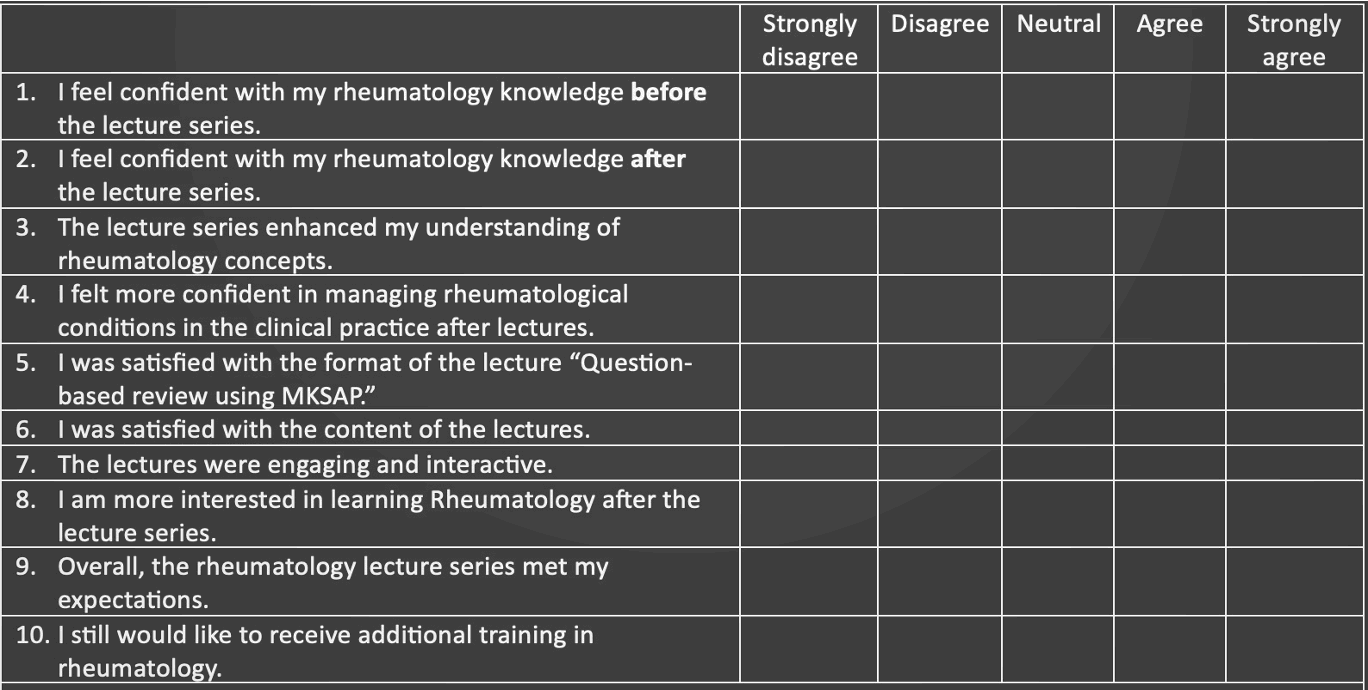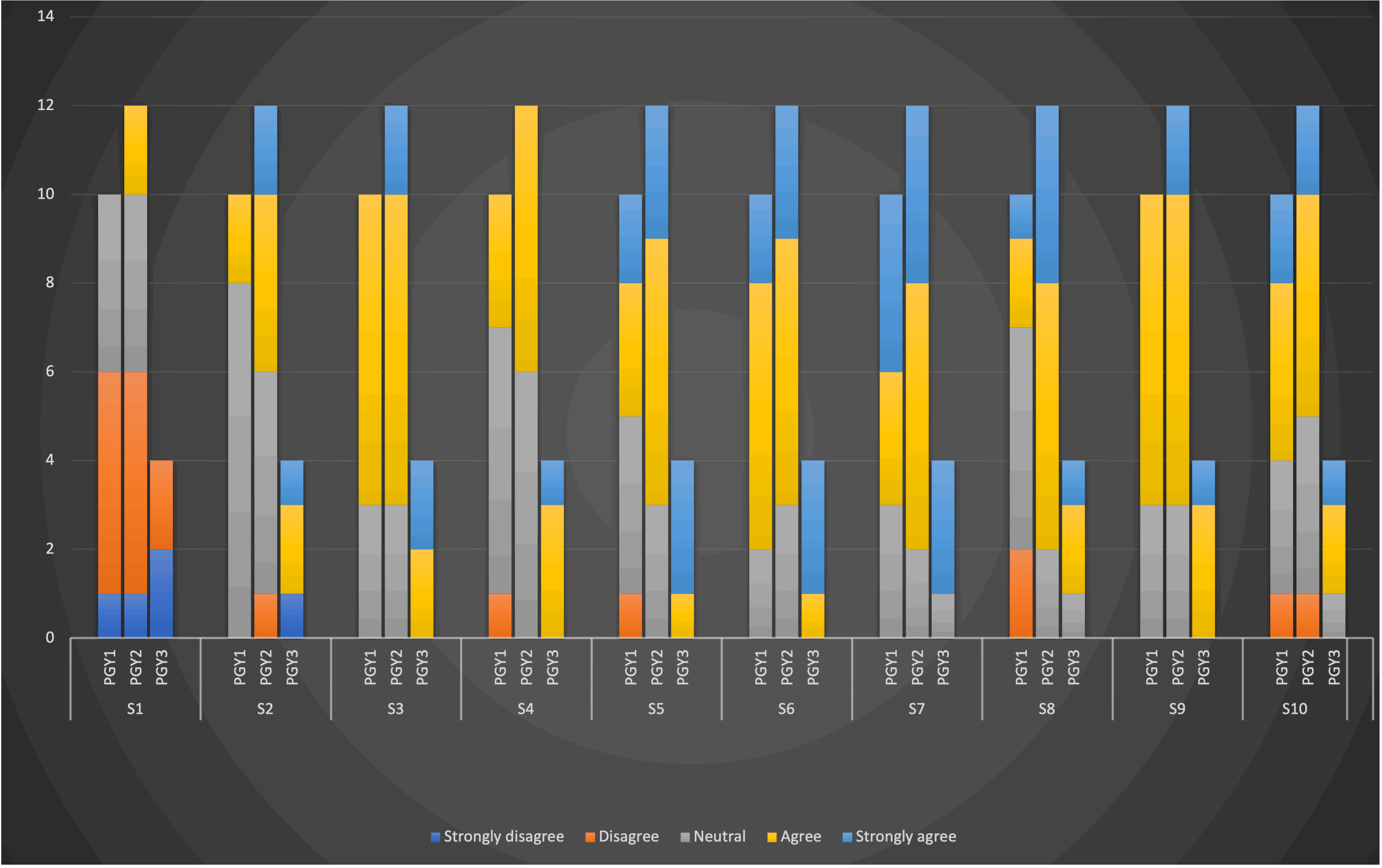Session Information
Session Type: Poster Session B
Session Time: 10:30AM-12:30PM
Background/Purpose: During their training, internal medicine (IM) residents often have limited exposure to rheumatology, resulting in decreased confidence levels and inadequate scores on the In-training Examination (ITE), which can correlate with lower board outcomes.1,2 Previous research has highlighted the necessity for a curriculum to address these educational gaps.3,4 Our aim is to strengthen the rheumatology knowledge of our PGY 1 and 2 Internal Medicine (IM) residents by introducing a question-based curriculum that corresponds with the content outlined by the American Board of Internal Medicine (ABIM).
Methods: In February 2024, we administered a 20-question pre-intervention quiz to 22 of 32 PGY1 and PGY2 IM residents during mandatory didactic conferences. Over the next eight weeks, residents participated in 10 lectures by Rheumatology fellows, covering 11 essential topics from the ABIM CERT Blueprint and MKSAP19 Qbank. In April 2024, a post-intervention 20-question quiz was given to 25 of 32 residents to evaluate the curriculum’s immediate impact.
A 14-question feedback survey using a 5-point Likert scale was collected from all three classes. (Fig.1) In fall 2024, we will compare rheumatology ITE exam scores of residents to those from August 2023, categorized by class. Our long-term goal is to assess the curriculum’s effect on ABIM examination scores in 2025 and 2026.
Results: The initial evaluation showed a baseline Rheumatology ITE score of 64/100 for PGY1 and PGY2 residents. Pre-intervention quiz scores averaged 50%, with PGY1 residents ranging from 25% to 70% and PGY2 residents from 35% to 80%. Post-intervention quiz scores averaged 43%, with PGY1 ranging from 20% to 85% and PGY2 from 25% to 65%.
Survey results revealed that only 50% of residents felt confident before the lectures. (Fig.2) Post-intervention, all parameters improved by 50% or more, except confidence in rheumatology knowledge, clinical management, and interest in learning rheumatology. Predominant impressions were “Neutral” for PGY1, “Agreeable” for PGY2, and “Agree-Strongly Agreeable” for PGY3.
Conclusion: The demand for enhanced rheumatology education among IM residents is evident. Satisfaction with the curriculum increased with PGY levels. Our tailored approach offers a promising strategy for improving expertise in rheumatology. Although similar strategies exist5, our initiative stands out as a pioneering effort in medical education quality improvement.
Several factors may have hindered post-intervention quiz improvement. The dense content may have required more time for absorption. Despite active participation, diverse learning styles may not have been effectively accommodated, leading to difficulty for some residents.6 Employing active learning techniques and varied teaching methods could enhance future quiz performance.
Acknowledgements: *Shadi Jafari-Esfahani and Merve Aksoy contributed equally to this work. Special thanks to Karl Greenblatt, MD, Will Scheuing, MD, Jose Garcia, MD, Mohanad Hadi, MD for their support and contributions.
To cite this abstract in AMA style:
Aksoy* M, Jafari-Esfahani* S, Ahmadzadeh Y, Gilek-Seibert K. Board-Style Rheumatology Teaching for Medicine Residents: Novel Approach to Curriculum Development [abstract]. Arthritis Rheumatol. 2024; 76 (suppl 9). https://acrabstracts.org/abstract/board-style-rheumatology-teaching-for-medicine-residents-novel-approach-to-curriculum-development/. Accessed .« Back to ACR Convergence 2024
ACR Meeting Abstracts - https://acrabstracts.org/abstract/board-style-rheumatology-teaching-for-medicine-residents-novel-approach-to-curriculum-development/


